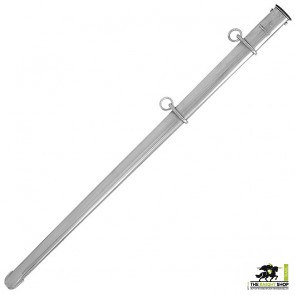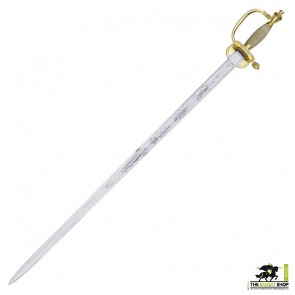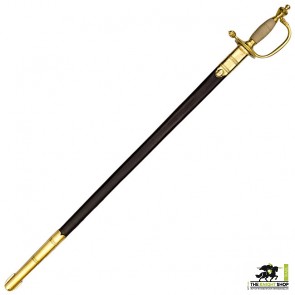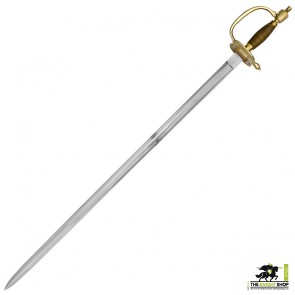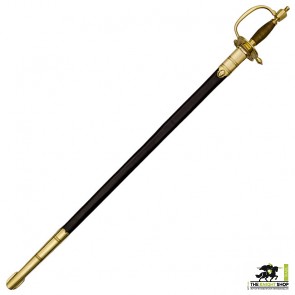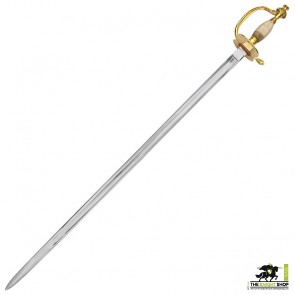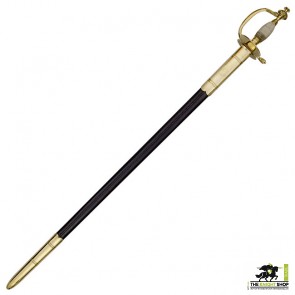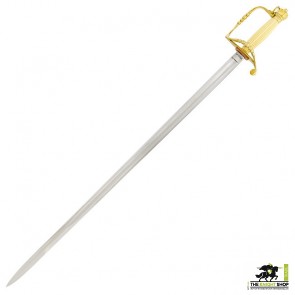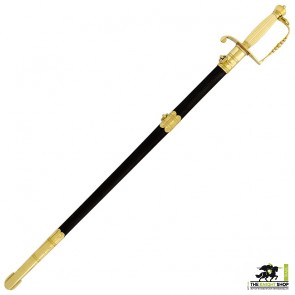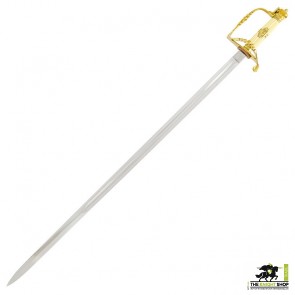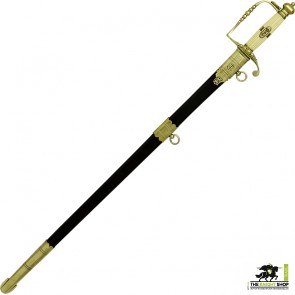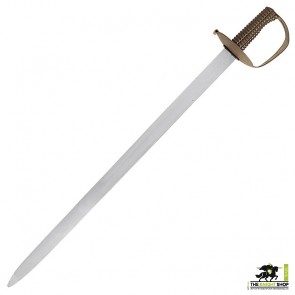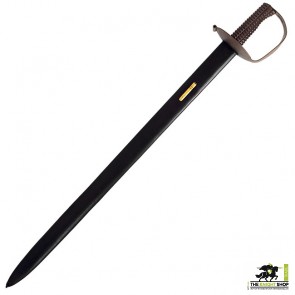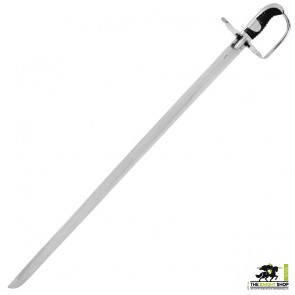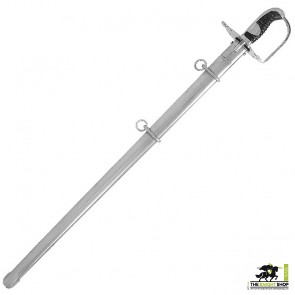Napoleonic Swords
-
Replacement Scabbard for British 1796 Pattern Light Cavalry Sabre
This replica scabbard is crafted from steel and fits our British Light Cavalry Sabre - 1796 Pattern US-S-133.
Learn More
Please note: These replacement scabbards are designed to fit our replica swords. Antique swords come in a variety of shapes and sizes and there is no guarantee that our replica scabbards will fit them. -
Replacement Scabbard for British 1796 Pattern Heavy Cavalry Sword
This replica scabbard is crafted from steel with an Osborn and Co stamp and fits our British Heavy Cavalry Sword - 1796 Pattern US-S-134.
Learn More
Please note: These replacement scabbards are designed to fit our replica swords. Antique swords come in a variety of shapes and sizes and there is no guarantee that our replica scabbards will fit them. -
British 1856 Royal Navy Midshipman's Dirk
This fantastic replica features ornate brass fittings and a forged and tempered steel blade housed in a premium grade leather scabbard. It is a faithful replica of an original dirk issued to Midshipmen in the Royal Navy during the age of sail.
Learn More
Its size makes it a great gift for naval enthusiast who hasn’t quite got the room for a full length cutlass!
Total length: 61 cm
Blade length: 47 cm
Grip length: 8.5 cm
Weight: 0.578 kg
Blade thickness (base): 6.4 mm
Blade width (base): 2.4 cm
Point of Balance (PoB): 8 cm
Edge: Blunt
Scabbard: Leather, Wood, Brass
All dimensions are approximate and may vary from piece to piece. -
British Infantry Officer's Sword - 1796 Pattern
This replica of the 1796 British Infantry Officer sword has a blade of unsharpened, tempered high carbon steel. Both sides of the blade feature the embossed cyper of the British Crown surmounted extensively by royal devices and floral motifs.
Learn More
It has a hilt of brass and a grip wrapped in copper wire that is plated with silver. Half of the guard is hinged and folds for ease of carry at the hip. The scabbard is of leather with brass accents.
Total length: 95cm
Blade length: 80cm
Grip length: 6.5cm
Weight: 784g
Blade thickness (base): 0.7cm
Blade width (base): 2.5cm
Point of Balance (PoB): 31cm
Blade: AISI 1065 High Carbon Steel
Edge: Blunt
Pommel: Nut
Scabbard: Leather, Wood, Brass
All dimensions are approximate and may vary from piece to piece. -
British Sergeant Sword - 1796 Pattern
This recreation of the British 1796 Sergeant’s sword has a plain blade of unsharpened, tempered, high carbon steel. The hilt is entirely of brass. The scabbard is of leather with brass accents.
Learn More
The sword is the longer version used by the sergeants instead of the shorter blade used by the musicians, though the overall sword design and construction were inherently the same.
Total length: 95cm
Blade length: 80cm
Grip length: 9cm
Weight: 882g
Blade thickness (base): 0.6cm
Blade width (base): 2.5cm
Point of Balance (PoB): 32cm
Blade: AISI 1065 High Carbon Steel
Edge: Blunt
Pommel: Nut
Scabbard: Leather, Wood, Brass
All dimensions are approximate and may vary from piece to piece. -
British Infantry Officer's Sword - 1796 Pattern
When the British Army standardized the swords to be carried by infantry officers in 1796 this is the sword they settled on; a spadroon-like cut-and-thrust sword with simple, but elegant Georgian styling that hearkened back to the Smallswords carried by gentlemen in earlier times. In just four years following, the blade was at the hip of practically all British Line Infantry Officers. Regardless of the standardization of form, the blades varied in their width and in their engraved decoration.
Learn More
Though widespread, it was not regarded as a good combat blade despite being used through the entirety of Britain’s contests with France in the Napoleonic Era. It would not be officially replaced until 1822 by the more elaborate ‘’Gothic-Hilted’’ sword and before then many officers had opted to acquire the 1803 Pattern sabre instead.
Total length: 100cm
Blade length: 85cm
Grip length: 6cm
Guard width: 9.5cm
Weight: 946g
Blade thickness (base): 0.6cm
Blade width (base): 2.5cm
Point of Balance (PoB): 33cm
Blade: AISI 1065 High Carbon Steel
Edge: Blunt
Pommel: Nut
Scabbard: Leather, Wood, Brass
All dimensions are approximate and may vary from piece to piece. -
British Officer’s 5 Ball Spadroon (Sword) - 1786 Pattern
The British Officer’s 5 Ball Spadroon was introduced in the 1780’s and was the first attempt at a uniform pattern sword for the British Military. It was called the 5 Ball Spadroon because of the decoration on the guard. This sword style was popular for both Infantry and Naval Officers and there were a number of variations of the pattern in use. It was even adopted by the French and American Military.
Learn More
Our British Officer’s 5 Ball Spadroon features a tempered high-carbon steel blade inscribed with a “KNUBLEY” makers mark to replicate an original produced by John Knubley, who was a sword cutler in London’s Charing Cross from 1785-1795. The ornate brass hilt features a brass side ring a reeded faux ivory grip. The wooden scabbard is covered with black leather and features brass fittings, the locket being stamped with “John Knubley 11 Charing Cross” on the reverse. It also features 2 brass hanging rings.
Total length: 94 cm
Blade length: 79 cm
Grip length: 10 cm
Weight: 816g
Blade thickness (base): 0.8cm
Blade width (base): 2.6 cm
Point of Balance (PoB): 17 cm
Blade: AISI 1065 High Carbon Steel
Edge: Blunt
Pommel: Nut
Scabbard: Leather, Wood, Brass
All dimensions are approximate and may vary from piece to piece. -
Admiral Nelson's Fighting Sword
The British Officer’s 5 Ball Spadroon was introduced in the 1780’s and was the first attempt at a uniform pattern sword for the British Military. It was called the 5 Ball Spadroon because of the decoration on the guard. This sword style was popular for both Infantry and Naval Officers and there were a number of variations of the pattern in use. This sword is a faithful replica of the one worn by the wax mannequin of Lord Nelson that was placed on display in Westminster Abbey in 1806.
Learn More
It features an undecorated, tempered high-carbon steel blade. The ornate brass hilt features a side ring and reeded faux ivory grip intersected with a brass band featuring a fouled anchor and crown. The wooden scabbard is covered with black leather and features brass fittings and 2 hanging rings. The locket is stamped with the fouled anchor on one side and “Richard Teed, Strand” on the reverse.
Total length: 99cm
Blade length: 83.5cm
Grip length: 9.5cm
Weight: 844g
Blade thickness (base): 0.6cm
Blade width (base): 2.5cm
Point of Balance (PoB): 17cm
Blade: AISI 1065 High Carbon Steel
Edge: Blunt
Pommel: Nut
Scabbard: Leather, Wood, Brass
All dimensions are approximate and may vary from piece to piece. -
British Royal Navy Boarding Cutlass - 1804 Pattern
This pattern of sword was introduced during the Napoleonic Wars and saw service at the famous Battle of Trafalgar. Previous cutlasses shared a similar figure 8 hilt design but featured horn or leather grips that deteriorated quickly when exposed to seawater and changes in temperature.
Learn More
The introduction of an iron grip greatly extended the serviceable life of this sword. The hilts were traditionally painted or japanned to stop them from rusting. The blade has been forged from AISI 1065 High Carbon Steel and has been well-tempered. It is housed in a black hardened buff leather scabbard.
Total length: 89 cm
Blade length: 74.5 cm
Grip length: 12 cm
Weight: 1.458 kg
Blade thickness (base): 6.3 mm
Blade width (base): 3.6 cm
Point of Balance (PoB): 15 cm
Blade: AISI 1065 High Carbon Steel
Edge: Blunt
Pommel: Threaded
Scabbard: Leather, Brass
All dimensions are approximate and may vary from piece to piece. -
British Heavy Cavalry Sword - 1796 Pattern
The 1796 Heavy Cavalry Sword was based on the Austrian 1775 pattern sword and was used by British Heavy Cavalry regiments such as the Dragoon Guards. The large blade had incredible cutting power but was cumbersome to use. It is perhaps most famous as the sword used by Richard Sharpe of the 95th Rifles in the series of books written by Bernard Cornwell.
Learn More
The polished blade has been forged from AISI 1065 High Carbon Steel and has been well tempered.
Replacement scabbard available separately
Total length: 102 cm
Blade length: 89 cm
Grip length: 9.5 cm
Weight: 1.266 kg
Blade thickness (base): 7.3 mm
Blade thickness (CoP): 5 mm
Blade width (base): 3.4 cm
Blade width (CoP): 3 cm
Point of Balance (PoB): 20 cm
Centre of Percussion (CoP): 21 cm
Blade: AISI 1065 High Carbon Steel
Edge: Blunt
Pommel: Peened
Scabbard: Steel
All dimensions are approximate and may vary from piece to piece.





